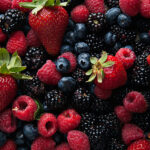KEEP PHYSICALLY ACTIVE TO PREVENT COLORECTAL CANCER AND INCREASE SURVIVAL
By Alan Barclay
/ November 1, 2023
Around the globe, low levels of physical activity are a major risk factor for most common chronic diseases including type...
Read More
EAT THE RAINBOW TO REDUCE COLORECTAL CANCER RISK
By GI Group
/ November 1, 2023
Plant foods, such as whole grains, fruits and vegetables are high in fibre and phytochemicals. Phytochemicals, phytonutrients are helpful chemicals...
Read More
THE GOOD CARBS KITCHEN
By GI Group
/ November 1, 2023
SPICE RUBBED FISH WITH QUINOA AND SWEET POTATO SALAD 0:25 Prep • 0:15 Cook • 4 Servings • Main •...
Read More
COPYRIGHT AND PERMISSION
By Alan Barclay
/ November 1, 2023
This website and all information, data, documents, pages and images it contains is copyright under the Copyright Act 1968 (Commonwealth...
Read More
GI NEWS – SEPTEMBER 2023
By Alan Barclay
/ September 1, 2023
GI News is published online by the University of Sydney, School of Life and Environmental Sciences and the Charles Perkins...
Read More
7 Replies
LEGUMES: SUSTAINABLE NUTRITION
By Alan Barclay
/ September 1, 2023
The legume family includes beans, peas and lentils. There are so many different varieties, and they can be prepared, eaten...
Read More
EATING LENTILS REGULARLY CAN IMPROVE INSULIN RESISTANCE
By Alan Barclay
/ September 1, 2023
Lentils (Lens culinaris) have been enjoyed by humans for many thousands of years, having been first domesticated in the Fertile...
Read More
LEGUMES MAY HELP WITH BLOOD GLUCOSE MANAGEMENT IN PEOPLE WITH TYPE 2 DIABETES
By GI Group
/ September 1, 2023
A review of the research looking at legume consumption and blood glucose management in people with and without diabetes has...
Read More
LEGUMES: CORNERSTONE OF A HEALTY PLANT-BASED DIET
By Alan Barclay
/ September 1, 2023
In recent years, vegetarian, vegan and other plant-based diets have been among the most popular diets around the globe. There...
Read More
BEANS, LENTILS AND PEAS
By Karen Lau
/ September 1, 2023
Do you like legumes? Are legumes part of your regular diet? They should be because they keep you full of...
Read More
THE GOOD CARBS KITCHEN
By GI Group
/ September 1, 2023
SHAKSHUKA WITH LENTILS AND FETA 0:10 Prep • 0:10 Cook • 2 Servings • Main• Everyday INGREDIENTS spray oil...
Read More
COPYRIGHT AND PERMISSION
By GI Group
/ September 1, 2023
This website and all information, data, documents, pages and images it contains is copyright under the Copyright Act 1968 (Commonwealth...
Read More
GI NEWS – JULY 2023
By GI Group
/ July 1, 2023
GI News is published online by the University of Sydney, School of Life and Environmental Sciences and the Charles Perkins...
Read More
WHAT TO DRINK?
By GI Group
/ July 1, 2023
Some health professionals and health activists like to ignore this simple fact - people love to drink Calories, not just...
Read More
SUGAR-SWEETENED BEVERAGES, ARTIFICIALLY SWEETENED BEVERAGES, FRUIT JUICE, AND CARDIOMETABOLIC HEALTH
By GI Group
/ July 1, 2023
Many studies have linked consumption of sugar-sweetened beverages (SSBs) with an increased risk of cardiometabolic disease. However, evidence for an...
Read More
COFFEE, TEA AND BLOOD GLUCOSE METABOLISM
By Alan Barclay
/ July 1, 2023
Observational studies suggest that regular consumption of coffee or tea may decrease the risk of developing type 2 diabetes. But...
Read More
INTENSELY SWEETENED BEVERAGES: ARE THEY A BETTER CHOICE?
By Alan Barclay
/ July 1, 2023
Everyone knows that the best drink to quench thirst is water. However, not everyone has access to fresh clean water,...
Read More
BEVERAGE CHOICES
By GI Group
/ July 1, 2023
What is your go-to beverage? As we all know, water is best for quenching thirst, but sometimes we enjoy other...
Read More























